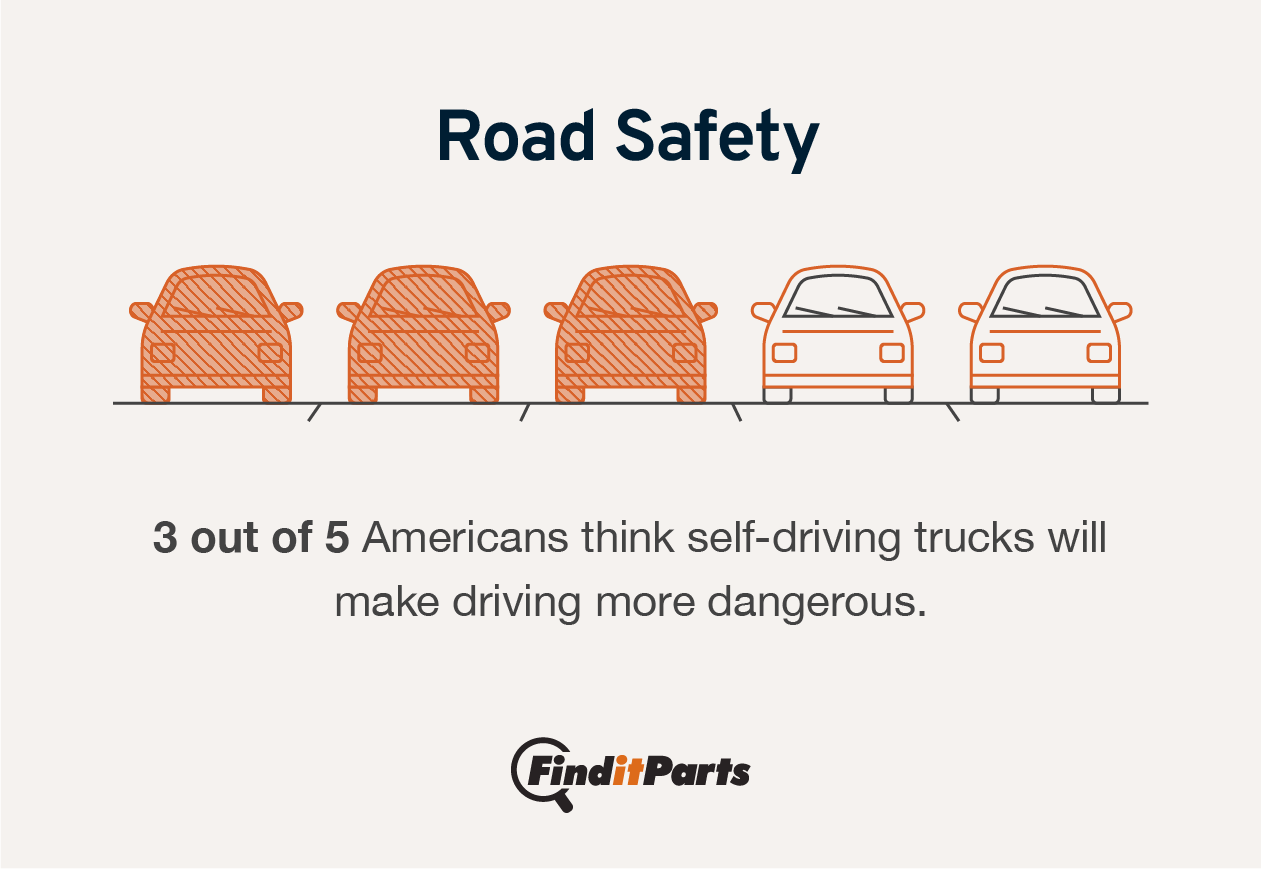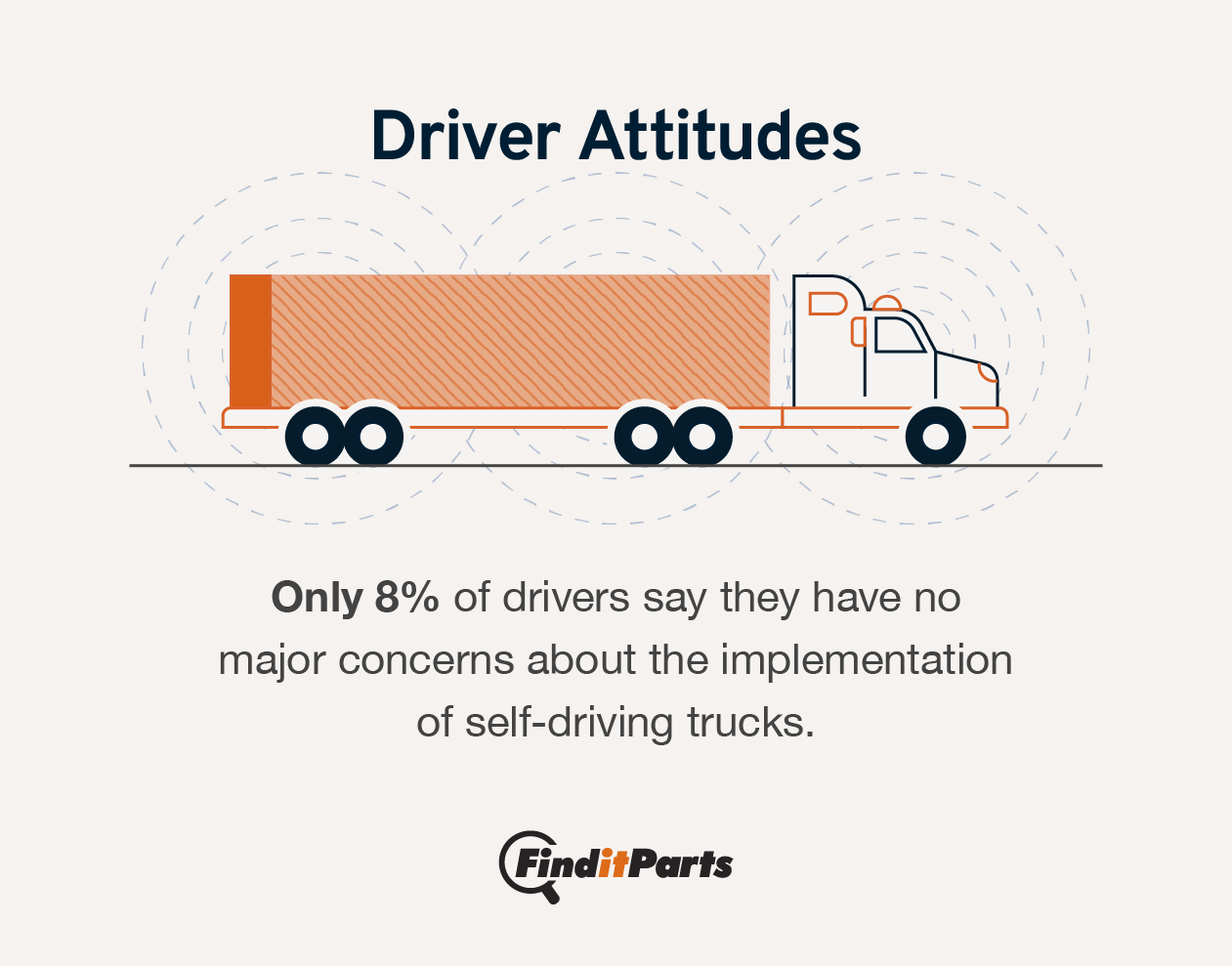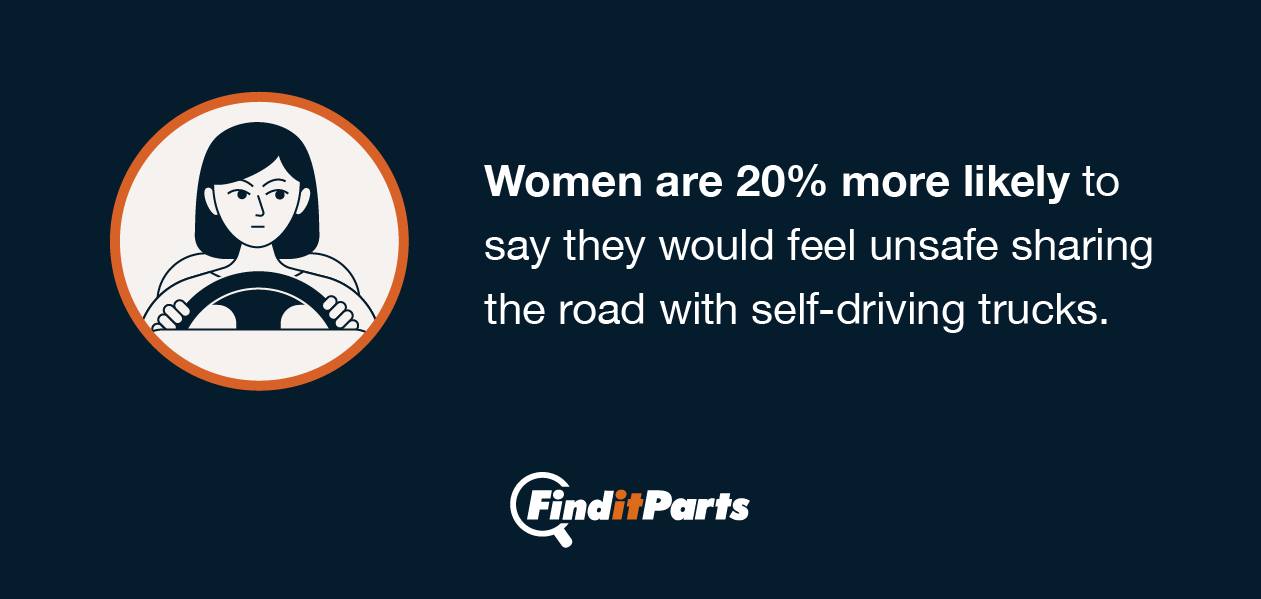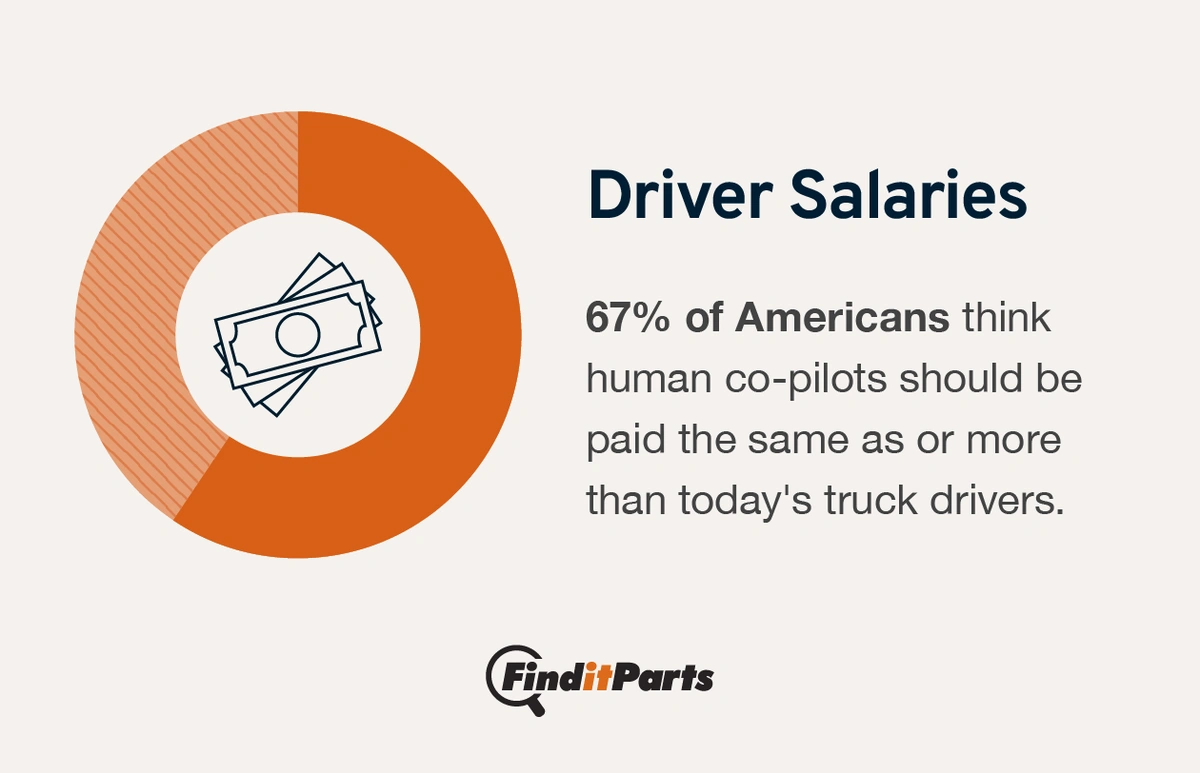Need help? We're here!
(888) 312-8812 Login SignupSelf-Driving Trucks: More Than 90% of Americans Have Concerns [Survey]
September 06, 2024
![Self-Driving Trucks: More Than 90% of Americans Have Concerns [Survey]](https://cdn.buttercms.com/GYcX71xeQqWcyS6njCji)
Self-driving trucks have been in the works since 2014, and by the end of this year, freight company Aurora plans to have fully driverless semis on Texas highways. But are Americans ready to share the road with autonomous trucks? We surveyed over 1,000 drivers to learn their biggest concerns about self-driving technology and its potential impact on road safety, the job market, and the trucking industry.
Key Takeaways:
- 62% of Americans believe autonomous trucks will make highway driving more dangerous.
- Only 8% of drivers say they have no major concerns about autonomous trucks hitting the roads.
- Women are 21% more likely to believe self-driving trucks will make roads more dangerous.
- 67% of Americans think human co-pilots should be paid the same or more than truck drivers today.
3 out of 5 Americans Believe Self-Driving Trucks Will Make Driving on the Highway More Dangerous
The big question when it comes to self-driving trucks is whether they'll be safe to share the road with. Our survey found that 62% of Americans believe autonomous trucks will make highway driving more dangerous. Of this 62%, around 1 in 2 respondents said that self-driving trucks will make roads much less safe.
While Americans were twice as likely to state that they'd feel safer sharing the road with autonomous cars than with autonomous trucks, 50% said they wouldn't feel comfortable driving around either—and this number was even higher for women and baby boomers.
Less Than 10% of Americans Have No Major Concerns When It Comes to the Implementation of Self-Driving Trucks
Bottom line: Americans are worried about how self-driving trucks will be implemented. Across all demographics, only 8% of drivers say they have no major concerns about autonomous trucks hitting the roads in the coming years.
Of our respondents, 44% were most afraid of the possibility of faulty or inconsistent safety technology leading to accidents. Another 20% said they were worried about liability in the case of a crash with a self-driving truck.
There has also been discussion of truck drivers losing their jobs — during an ongoing truck driver shortage — due to autonomous vehicles, which 17% of Americans chose as their number one concern. And finally, 11% of respondents said they were most worried about self-driving trucks not being carefully regulated by the government.
Women Are More Worried About Self-Driving Trucks
Our survey found notable differences between men's and women's attitudes toward self-driving trucks. While 53% of respondents who identify as men believe self-driving trucks will make roads more dangerous, that number was 71% for those who identify as women—a difference of almost 20%.
Female drivers were more likely to say they'd feel unsafe sharing the road with autonomous vehicles or using self-driving features in a passenger car. On the other hand, male respondents were three times more likely than women to say they have no major concerns about self-driving trucks.
While women are generally more apprehensive than men about the potential dangers of autonomous semi-trucks, 48% do think autonomous semi-trucks could help lower shipping costs, improve safety, or remedy truck driver shortages. This number was higher for men (63%), but it shows that, despite reservations, some respondents still see benefits to self-driving trucks.
Most Americans Believe Human Co-Pilots Should Be Paid the Same or More Than Today’s Truck Drivers
Much of the controversy surrounding autonomous trucks involves the possible impact on job security for truck drivers. Self-driving trucks haven't been fully implemented yet, so it isn't clear whether they'll be manned by human co-pilots. But if they are, 67% of Americans think human co-pilots should be paid the same or higher salaries than truck drivers today.
Additionally, nearly 60% of respondents say they'd feel safer sharing the road with self-driving trucks if they were manned by a human being. With a co-pilot, there's always someone ready to take control in the event of a computer malfunction or sensor issue.
This safety precaution is important for Americans: While some companies are pushing for fully driverless cabins, only a small minority of people (16%) believe autonomous trucks should not have human co-pilots. But not everyone is aligned on co-pilot salaries—18% of respondents said they should be paid less than truck drivers make now.
Baby Boomers Are More Concerned About Autonomous Trucks Than Other Age Groups
Among all age groups, baby boomers are the least receptive to self-driving trucks and autonomous vehicles in general. In our survey, 80% of respondents age 60 and older said they think driverless semis will make traveling on the highway more dangerous.
Compared to Gen Xers, millennials, and Gen Zers, boomers were twice as likely to state that no safety feature will make autonomous trucks safe to drive around. This skepticism toward self-driving technology applies to smaller vehicles, too, as 70% of boomers said they wouldn't feel safe using the self-driving mode in a passenger car. For other age groups, that number was closer to 40%.
When it comes to human co-pilots, 80% of baby boomers said they should be paid the same or more than truck drivers make today—the highest percentage of any age group. Overall, older Americans show a clear preference for keeping human beings in truck cabs and a high level of concern about autonomous vehicles.
6 Tips for Driving Safely Around Trucks
Self-driving trucks may not have landed on your roads yet, but that doesn't mean you'll be unprepared when they do. Truck accident statistics show only a small percentage of crashes are due to trucks, but it's important to be vigilant. Safe driving is safe driving, whether you're sharing the highway with an autonomous semi or not. Protect yourself and others by following these tips:
- Wear a seatbelt: This rule is basic because it works. You're about twice as likely to survive a collision if you have your seatbelt fastened.
- Maintain safe following distances: Following a truck too closely increases your chances of an accident. When traveling at 40 mph or higher, try to keep five seconds of distance between your car and a semi.
- Know your blind spots: Most drivers can't correctly identify all of a semi-truck's blind spots. Be sure you know whether you're visible to truck drivers using the diagram from our trucking safety survey.
- Perform regular vehicle maintenance: Inspect your truck or car often so you know it's safe to operate—it could be the difference between a smooth trip and a dangerous one.
- Keep your eyes on the road: With self-driving trucks primed to hit the road, it's more important than ever to be aware of your surroundings and avoid distractions while behind the wheel.
- Plan your routes carefully: If possible, map out your routes beforehand so you can be prepared for potential hazards, unsafe roads, and poor weather conditions.
Our survey shows that autonomous truck manufacturers have work to do when it comes to public opinion. Many Americans remain unconvinced that self-driving trucks will be safe to share the road with, and they have concerns about faulty technology, accident liability, and the potential loss of jobs for truckers.
At FinditParts, we sell all the heavy-duty trucking equipment you need to ensure your truck is road-ready no matter where you go or what kind of vehicles you share the road with.
Methodology
The survey of over 1,000 adults ages 18+ was conducted via SurveyMonkey Audience for FinditParts on August 1, 2024. Data is unweighted and the margin of error is approximately +/-3% for the overall sample with a 95% confidence level.







